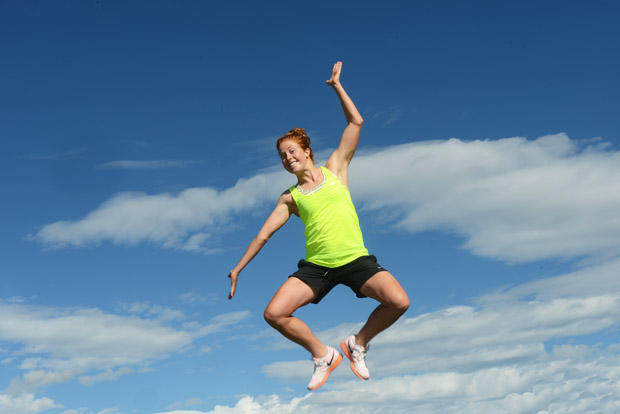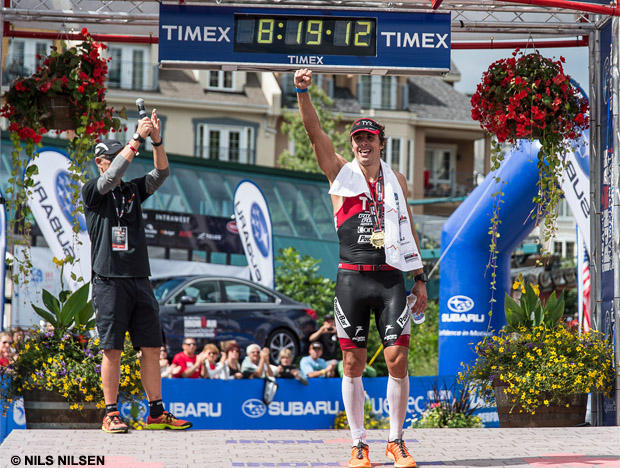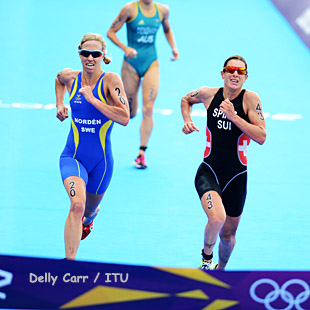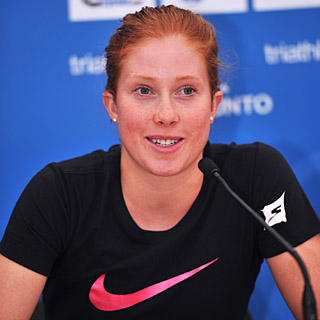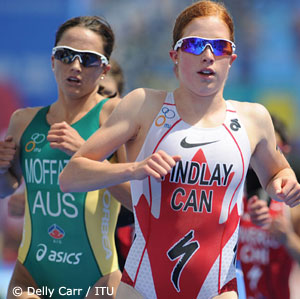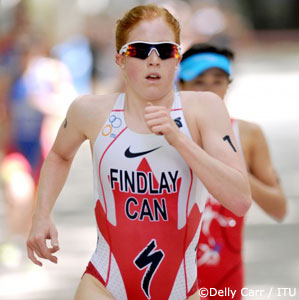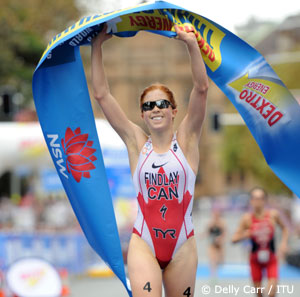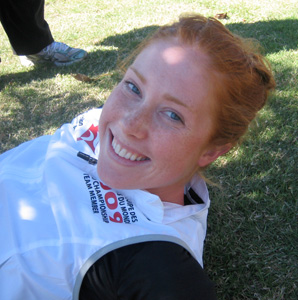Paula Findlay – a new day
At first, it all came easy for Paula Findlay. She was 3rd Under 23 at the 2009 ITU Grand Final on the Gold Coast. In 2010, she won a Pan American Cup in Coteau-du-Lac, a World Cup in Monterrey, and took 4th at the Hy-Vee Elite Cup before really breaking through with World Championship Series wins at London and Kitzbühel. In 2011, she earned World Triathlon Series victories at Sydney, Madrid and Kitzbühel and seemed unbeatable before a hard-to-diagnose hip malfunction forced a DNS at the Edmonton World Cup and a 29th place finish at the London WTS.
While she fought hard to recover and believed she was healthy for the London Olympics, her day unraveled and so did her confidence. She continued to train and work hard with excellent coaches, but through most of 2012 and 2013 — with the exception of a win at the 2013 Sarasota Pan Am Cup sprint — her hip remained balky and nothing clicked. This March, she had an encouraging 9th at the New Plymouth World Cup won by Katie Hursey. But in May, she suffered a spirit-crushing stress fracture in her pelvis and contemplated retirement.
Just two months ago, she signed on with coach Siri Lindley. Under a careful, gradual regimen, two good things happened – she stopped feeling pain and she had a promising second place finish at the Kelowna Pan American Cup Sprint. After careful consideration, Triathlon Canada High Performance Director Libby Burrell gave Findlay the OK to start the ITU World Triathlon Series Grand Final this weekend in her home town of Edmonton with one proviso – no expectations allowed.
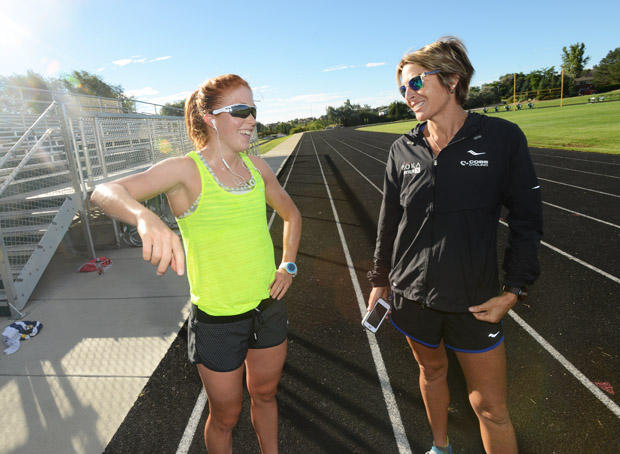
Slowtwitch: How did you feel approaching the Pan Am sprint at Kelowna this month?
Paula Findlay: It was a small race, so I wasn't too stressed out about it. I wasn't really sure where my fitness was. I had been training well with Siri but I wasn’t so confident because I hadn’t done a lot of running on the ground. I think over the last couple of years, I have been afraid to get into that zone of discomfort in races because I was just scared. I didn't trust my body and I was thinking I was going to break down. But things have been a lot better with Siri.
ST: What is it like working with Siri as your coach?
Paula: Siri is motivating. She makes me want to get into that zone of hurting and not being afraid of my competitors. And thinking I can be just as good as everybody else. So that was the attitude that I approached Kelowna with. I went all out on the swim and I was just relentless on the bike — like I used to race. And while I couldn’t run up to my ability, it was better than I anticipated. So it was definitely the first step towards getting back.
ST: How was your run form?
Paula: Honestly I kind of forget how I used to run. I used to run low 34 minutes off a 40k bike. Yeah it’s been so long I forget what that fluid, effortless feeling is like. When I would run and win those big races, I felt really comfortable most of the way and on that last lap or two, I would pick it up. I think that came from a history of running a lot of track when I was younger – plus I had a good aerobic base from my swimming background. So that all worked to turn me into a good triathlete.
ST: So how did it feel to lose your powers of running while dealing with injuries?
Paula: The past three years I’ve missed base running and missed that that track work. And I haven’t been swimming as much. I think that now I am healthy I can start building back towards that. But as far as rediscovering that fluidness, I am feeling little glimpses of it in training. In the race last weekend it didn’t feel quite so smooth and easy as it used to be. But I am getting to the point where I can go for an hour jog and it feels good instead of feeling like I just need to survive the workout, I am looking forward to it.
ST: As you get healthier, you don’t need to feel so defensive every step of the run?
Paula: Yeah. The other thing I must face is fear of injury. I need to get over that, too. The challenge is physical, too, of course. But a lot of it is psychological. In my head, I know I am coming off a pelvic stress fracture. So before I was ready to go all out, I’d think about is how my pelvis was feeling. Now I don’t even think about it at all.
Q What was it like when your injuries were getting the best of you?
That is why I lost touch with my love for it. When I started triathlon I never really had a bad experience. Every race I did as a junior I was on the podium. So when I got injured and started falling further back in the rankings it was really hard and it was not as fun. Winning is fun and that is why we do it.
ST: What will motivate you going forward?
Paula: That is something I am working towards, whether that is two months down the road or a year down the road or Rio 2016. Right now I am healthy and I can see myself doing well there. Whereas just before these last few months I couldn’t even imagine myself racing well.
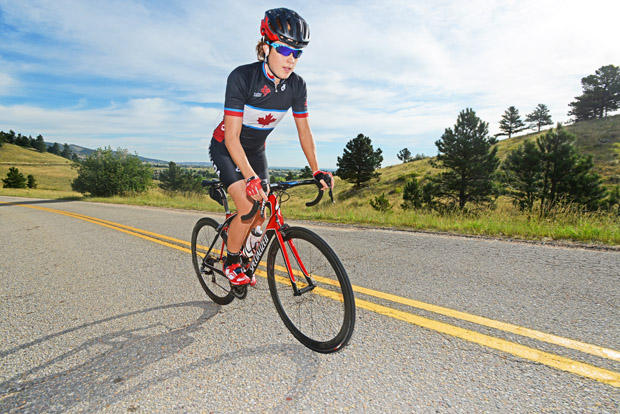
ST: What is your mindset when things were going well?
Paula: I am relentless. I want to go in and win every race I do. But I have come to realize it is not handed to me. You have to work really hard for it. When I was younger it seemed to come easy to me. But it was because I worked hard when I was younger and I had a good base and good background and some genetics and good coaches and good support. I am finding love for it again because I have race targets and most of it – the love – is coming from Siri and her squad. Siri’s positive energy and her encouragement is infectious.
ST: When did you first meet Siri?
Paula: I went to Kona in 2011 with Specialized to watch the race and I saw Siri coaching Rinny and Leanda. Siri was on the scooter and I was sitting there with my mom and Siri she was just so positive and cheering them on. I said to my mom. ‘It would be so cool to be coached by Siri Lindley.’ But I never considered it. I had a coach.
ST: What was the original injury? I saw you before the WTS London race in 2011 and you were thinking you might just swim and ride.
Paula: That was the very start of all my injuries. I still had overwhelming confidence that I could get over it. I had won five races in a row. I thought the worst that could happen would be if I got 7th or something. Heh heh. I just had so much confidence in myself. I went out on the run with the leaders. I had the speed but not the fitness to keep up for a 10k
ST: When did it start?
Paula: A hip injury before Edmonton in 2011 [Findlay did not start – after WCS wins at Sydney, Madrid and Kitzbühel]. No one knows exactly what it was. Some said bursitis. Other said labral tear. I didn't want to dwell on what it was leading into the Olympics. So, I don’t really know what it was.
ST: Kirsten Sweetland has come back after a long time lost to injuries and rehab. Does that give you confidence you can make it all the way back?
Paula: She has done a lot better than me in her comeback.
ST: OK. Yours is beginning and hers is flowering.
Paula: Yeah absolutely. It is really inspiring to see that because Kirsten went through a rough patch. But it wasn’t just a year – more like four years of rough times. She could have given up at any moment. It would have been easier for her it throw in the towel and say, ‘I guess I am too hurt. My body is not cooperating.’ Other people were giving up on her, but she never gave up on herself. It is also interesting — she took periods of time off. She took like two months off at one point and then she would come back and race really well. There are lots of lessons for me in her struggles. You can take time off and it is good for your body and you can come back strong.
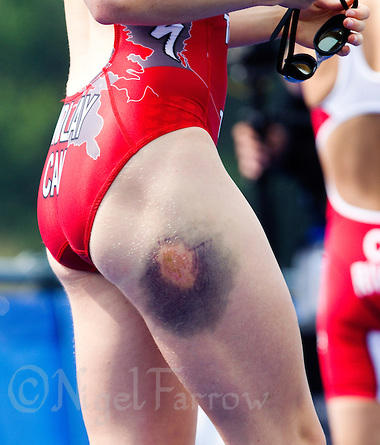
ST: Why did you choose Siri — and why do you think Siri agreed to take you on?
Paula: I was thinking about all the different options. To be honest there aren’t a ton of options. There isn’t really a lot of options in the world of world class triathlon coaches. I was making a list of all of them only I didn’t really consider anyone except Siri. Because I just remember watching her and meeting her in Kona in 2011. Plus I know Lauren Groves and Sarah Groff and they have been in her squad before. My only concern was whether an Olympic distance triathlete would fit with her squad. I know it is primarily Iron distance people. But she was not concerned about that at all. She said I would fit in very nicely with the squad. Just because I am training with Ironman people – I am not training like an Ironman.
ST: How different are you approaching things with Siri as your coach?
Paula: It is definitely exciting to come to training because of her encouraging attitude and her belief in me. I think she believes in me more than I believe in myself. She sees something in me that I don’t see. It is really cool that she has done it. So she knows what it feels like and she can relate to me in a lot of different ways.
ST: What are some of those ways?
Paula: I like hearing about how she approached nutrition. And how she approached races — she got super nervous too. And her little habits – it is really cool to hear those things. Not only from Siri, but also from the group that I am in. I am excited to be training with the best Ironman athletes in the world. They are so fast it is incredible. So even though they do a totally different distance, I am not lacking training partners at all. I think it is a positive thing for me too because I am not competing in training. I don’t have to see what my competitors are doing as with previous groups I was training with.
ST: What happened before?
Paula: Back when I would get crushed in a set in the pool I’d feel awful about myself. But I swim well with Siri because mentally I am leading my way, I’m doing really well, I am swimming fast times and I don’t feel I am competing with anyone.
ST: How did this help you?
Paula: A lot of getting out of this funk that I am in is feeling getting confident about myself. That is a lot easier in this environment. I really love it.
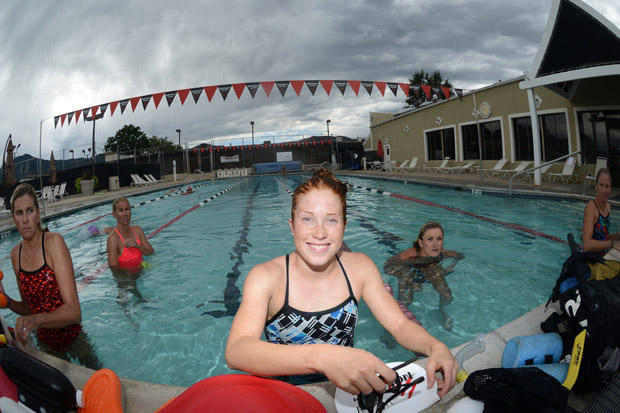
ST: What is her style of communicating?
Paula: In the middle of a workout, sometimes you really need to hear that encouragement. Especially after workouts I used to feel like I wasn't successful – or not as great as I wanted. But she says “That's awesome!” I don’t know if she actually is – but she says she is really impressed with me all the time. Just hearing that is a huge confidence builder. Coming in this past spring, my confidence was at an all-time low. And it has been low the past couple years. So that is starting to come back and a lot of it is being told I am doing well.
ST: Has she been gradual building your aerobic base and not being in a hurry?
Paula: I think every coach that I've had since my injury has tried to do that. My previous coaches were like that, too. They would say, “We are not in a rush.” “We have time.” “We want to do this slowly and progressively.”
ST: What is different about Siri’s approach?
Paula: Siri is very strict about like making it very precise and exact. We started this June on the Alter G Energy Treadmill at 60 percent of body weight.
ST: How does this work?
Paula: It’s a way you can get the feel of running without damaging your legs. You go on a treadmill and fit yourself in to the AlterG shorts and climb into the plastic-covered ‘cockpit.’ Then the machine fills it with enough air to lift your legs up and away from the treadmill belt. You are kind of suspended in much lighter gravity while you run. It is an amazing tool. It was the reason I could get back to fitness and running so quickly. I’ve only been running on the ground for three weeks now. But I have done a month and a half on the Ultra G. So you do get really fit with it. We are adding 5 percent every week. We never strayed from that plan. It is a safer way to return to the ground and progressively advance from zero gravity to full body weight.
ST:How sharp is Siri’s eye for what's going in on in your body and spotting any deterioration of your form?
Paula: I think she is thinking a lot more than what she is saying to me in the workouts. So, I am still getting to know her. It’s only been a month and a half or two months I’ve been working with her. But so far so good.
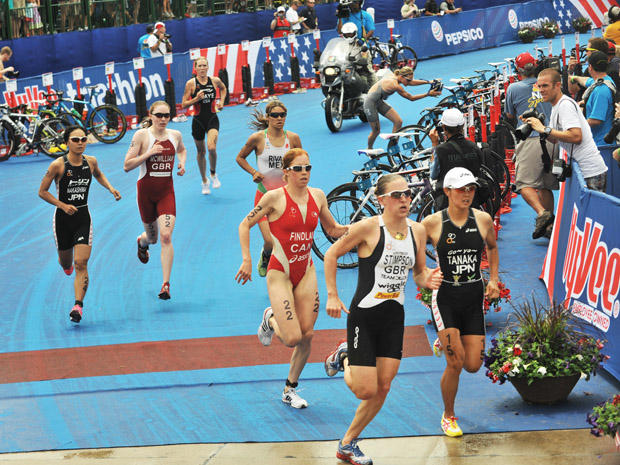
ST: What was your impression of her when you signed on and what have you learned about her in these first weeks?
Paula: When I first got here it was a really big contrast — being on deck with a coach who made you excited about the next workout. It was the delivery of the workout. Going all out max effort for eight 100s or whatever was not a scary thing because the way she delivers it — “It is making us better,” “It is fun,” “It is exciting.”
ST: What is it like working with her squad?
Paula: Everyone is so, so talented. The fact that they are in her squad means a lot. I have total trust and confidence in Siri. A lot of my return to being world class is being happy doing it. I’ve been told that by quite a few people that I hadn’t been happy at all. I was being pulled in a lot of directions and I was trying to figure out what to do next after leaving [coach] Joel [Filliol]. The biggest reason I came to Siri was I needed to reignite my passion and my love for triathlon and she definitely has done that. Now I know that she is the one to get me fast and fit again.
ST: How did it feel being a Canadian national sports hero?
Paula: I don’t really think of myself like that. I was kind of thrown into the spotlight pretty young and had to learn how to deal with media and sponsors and attention. That is really easy to deal with when you are having success. But then if things go sideways it is really hard to deal with. People don’t fully understand the sport — the public anyway. They think winning a race like Kelowna is no different than the world championships. I still have a long way to go.
ST: There were positive aspects to the fame?
Paula: I like that triathlon gets attention. Every time I go home and race I am in the paper. Even when I am starting out again, it is raising awareness for triathlon and I am happy to help to do that. Simon Whitfield did that for his entire career. He grew triathlon in Canada and now when little kids come up to me I think it is the coolest thing ever. I can’t believe it because I still want Emma Snowsill’s autograph and Mirinda Carfrae’s autograph. I am still one of those little girls looking up to every competitor.
ST: Do you feel like that little girl in these workouts in Siri’s squad?
Paula: Oh absolutely. Yeah. I think it is so cool even when I am in the same lane as Mirinda and Jodie.
ST: How do they treat you?
Paula: The same way that Siri does. They see me as a talented athlete who has the potential to do it again. They know who I am. That is the coolest thing.
ST: Even for the legends, triathlon offers the highest of highs and the lowest of lows. You took your Olympic experience very hard [She finished 52nd at last at London].
Paula: There was a lot of pressure going into it. No one really knew what was happening behind the scenes. There was a lot of stuff. I was injured and I was going through appeals [to determine if she was fit enough to remain on the team]. And all these coaching changes. I felt I did a really good job of composing myself and managing myself positively leading into the Games. But afterwards I just realized how much I had been through and how difficult it was. Going in, I didn’t let that cloud my vision. I wanted to win a medal and I still believed it was possible. A lot of people were criticizing me afterwards for taking a spot away from the alternate. They said I did not deserve to be there because I was injured. But before the race, I was totally not injured. I was training and had awesome run workouts and was fully healthy on the start line.
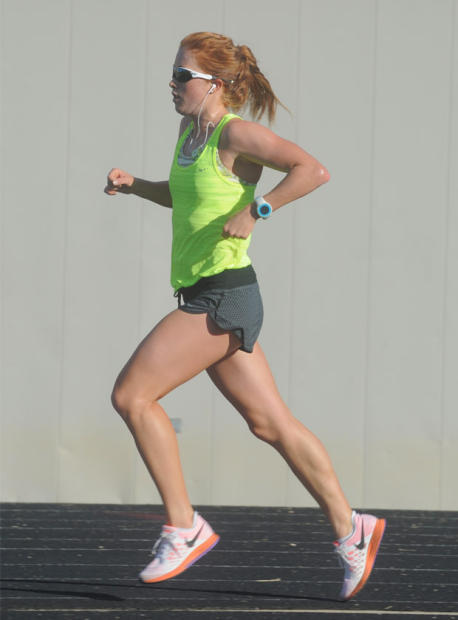
ST: If you felt you were injured, would you have started?
Paula: If I had any pain beforehand I wouldn’t have started. That would have been unfair. I wasn’t going to start just to say I am an Olympian. I wanted to go and win a medal. In training runs I thought it was possible. Maybe that was a little naïve of me. But the reason for my awful performance was not an injury. I didn’t run well not because I was in pain or was limping. It was because — I don’t know what it was. There were lots of factors. It might have been due to not having recent competitive race experience.
ST: I’d say for a time in 2010 and 2011, you were among the five best women ITU triathletes in the last 15 years. Do you see anything stopping you from returning to that form?
Paula: The biggest obstacle is my mind.
ST: Really?
Paula: Physically as well because I do have a lot of work to do to get back to my run form. But that comes so much with confidence and belief in yourself. With my workouts the last few months, I have seen I am doing better. I believe that I truly am. So, this is a testament to the importance of being in a positive environment. Over the past two years it isn’t as if I didn’t train a lot. I have remained a full time triathlete for two full years. I have been cycling a ton and swimming so much. And I haven't really moved forward very much. I definitely haven’t shown it in many races.
ST: I saw a Canadian interview in which you said at times you felt you should quit?
Paula: Oh for sure I thought about that lots of times. It was only last March that I called my mom Sheila Findlay in tear and said, ‘I want to quit. I want to come home.’ I just had coffee with Joel [Filliol] and I said ‘I can't do this anymore. I want to go home.’ I don’t know what it was that was keeping me there. I know that I love the sport but I just wasn’t in the place that would allow me to be enjoying it and to move forward. So, I knew I had to make a change.
ST: How did your mom [Edmonton Grand Final Competition Director Sheila Findlay] react?
Paula: She is very protective and worries about me a lot. As soon as I said that, she said, ‘Well just come home. Pack your bags. Get over here.’ She wants to mother me and protect me. She wants me to be happy. And I wasn’t happy.
ST: Did you go back home?
Paula: I did eventually come home. But it was because I had a stress fracture. In my time away, I made a lot of changes. Now when I call, I talk to my mom all the time and she knows I am happy here. She met Siri in Kona and absolutely loves her. She can just tell. I send my mom pictures every day, messages all the time. She can see the contrast between now and last year. And since I am happier, she is happier too.
ST: How have you prepared yourself for Edmonton? I think you look at it as experience that will pay off in the long run. But it’s not do or die for the podium.
Paula: Yeah for sure. It just got released in the press that I was going to be racing at Edmonton. I totally didn't anticipate that would even be a story. I was hoping it would fly under the radar. I want people to understand that Edmonton is not the quality of field that Kelowna was. Just because I won a medal in Kelowna at a little Continental Cup it does not mean I am going to do the same at Edmonton. It would be disrespectful to Gwen [Jorgensen] and Jodie [Stimpson] to think I could walk in and outrun them. They are on another level right now.
ST: On the other hand, you can take some encouragement that Katie Hursey has proved she is a first rate competitor.
Paula: Katie is really talented. That is why being that close to her at Kelowna is really reassuring. Swimming with her — she got out of the water first in two world World Cups this year – and riding with her was good. So I am confident that I am fit – but not over a full 10k run. I don’t have any expectation of placing. I think the most exciting thing will just be racing on a course I have been training on since I was 16. I ran cross country in that park for five years at University. I know every single little trail and turn and bump and on the bike course. I could ride it with my eyes closed.
ST: How will you feel to race a home town world championship?
Paula: I know I will be nervous. I don’t regret at all that I will be on the start list. I am excited for it. And Siri has a great perspective on it.
ST: What did she say about this?
Paula: She is not rushing me to prepare me for it.
ST: You did well with no speed work going into Kelowna?
Paula: I wasn't doing anything to prepare for that race at all. We are doing things very progressively. Today I did a one hour build run. We are not rushing to do 10x400s all out just because I am racing next week. I believe Siri has a plan and I am trusting her completely. She is not putting pressure on me. She is just seemingly impressed with my performance and my return to running.
